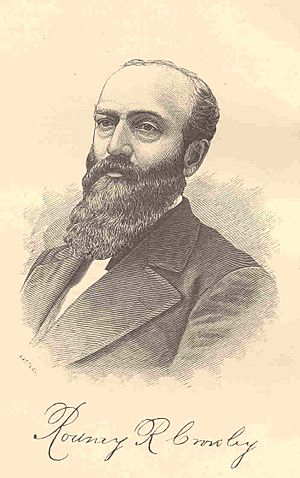Rodney R. Crowley facts for kids
Quick facts for kids
Rodney Rufus Crowley
|
|
|---|---|
 |
|
| New York Inspector of State Prisons | |
| In office January 1, 1876 – February 17, 1877 Serving with Moss K. Platt (1876)
George Wagener (1876-1877) Benjamin S. W. Clark (1876) Robert H. Anderson (1877) |
|
| Deputy New York State Superintendent of Banks | |
| In office October 14, 1893 – circa 1895 |
|
| Preceded by | William F. Creed |
| Personal details | |
| Born | November 12, 1836 Mount Holly, Vermont |
| Died | 1913 (age 77) Randolph, New York |
| Spouse |
Jane Hobart Mussey
(m. 1861–1913) |
| Children | Frederick Bowen Crowley (b. 1865) Mary G. Crowley (b. 1872) |
| Parents | Parmelia and Rufus Crowley |
Rodney Rufus Crowley (born November 12, 1836 – died 1913) was an American lawyer and politician from New York State. He served as a New York Inspector of State Prisons from 1876 to 1877. This job involved overseeing the state's prisons.
Contents
Rodney Rufus Crowley's Early Life
Rodney Rufus Crowley was born on November 12, 1836, in Mount Holly, Vermont. His parents were Parmelia and Rufus Crowley. When he was about five years old, in 1841, his family moved to Yorkshire, New York. Later, in 1848, they moved again to Randolph, New York.
Becoming a Lawyer
Rodney Crowley studied law and became a lawyer in 1861. This meant he could practice law and help people with legal issues. He also served as a Justice of the Peace in Randolph in 1861, 1866, and 1872. A Justice of the Peace is a local official who handles minor legal cases and keeps the peace.
Family Life
On September 3, 1861, Rodney Crowley married Jane Hobert Mussey. She was born in 1835. They had two children: a son named Frederick Bowen Crowley, born in 1865, and a daughter named Mary G. Crowley, born in 1872.
A Soldier in the Civil War
Rodney Crowley bravely fought in the American Civil War. He joined the army on August 17, 1861, as a private. By the end of the war, he had become a captain. He was injured twice during his service. He was wounded in the Battle of Seven Pines and again in the famous Battle of Gettysburg. Because of his injuries, he was discharged from the army on November 6, 1863.
Rodney Crowley's Public Service Career
After the war, Rodney Crowley continued to serve his community in various roles.
Helping Native American Lands
In 1867, he was chosen to be a Commissioner. His job was to investigate and find out what damage had been done to lands belonging to Native American tribes. These lands included the Cattaraugus Reservation, Allegany Indian Reservation, and Oil Springs Reservation. He presented his findings to the New York State Senate in 1868.
Local and State Roles
Rodney Crowley was the Supervisor for the Town of Randolph in 1868 and 1869. A Supervisor is like a leader for the town government. From 1869 to 1871, he worked as the Collector of Internal Revenue for the 31st District of New York. This role involved collecting taxes for the government. In 1874, he was a Trustee for the Village of Randolph.
Inspector of State Prisons
In 1875, Rodney Crowley was elected as an Inspector of State Prisons. He was part of the Democratic ticket. He held this important position from January 1876 to February 1877. The job of an Inspector of State Prisons was to check on the conditions and management of prisons in New York State.
However, this office was changed by a new rule in the state's constitution in 1876. The three last Inspectors, including Rodney Crowley, left their jobs when a new position was created: the Superintendent of State Prisons.
Deputy Superintendent of Banks
On October 14, 1893, Rodney Crowley was appointed as the Deputy New York State Superintendent of Banks. In this role, he helped oversee banks in New York State. He took over duties from William F. Creed. He served in this position until around 1895.
Later Life
Rodney Rufus Crowley passed away in 1913 in Randolph, New York, at the age of 77. He may have been buried in the Randolph Rural Cemetery.
 | Madam C. J. Walker |
 | Janet Emerson Bashen |
 | Annie Turnbo Malone |
 | Maggie L. Walker |

